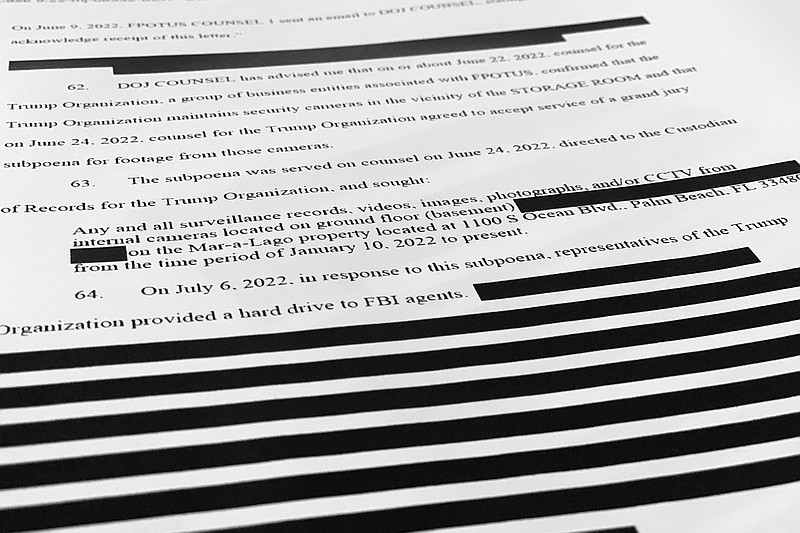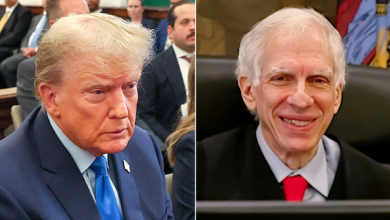
Judge Suggests Portions of Trump Search Affidavit Could Be Released
Judge Suggests Portions of Trump Search Affidavit Could Be Released, a move that has sparked intense debate and legal maneuvering. This decision, made by a federal judge in Florida, stems from the ongoing investigation into former President Donald Trump’s handling of classified documents.
The search warrant, executed at Trump’s Mar-a-Lago residence, has raised questions about potential national security risks and the extent to which the public should be privy to details of the investigation.
The affidavit, a sworn statement detailing the evidence supporting the search warrant, has become a focal point in the legal battle. The government has argued that releasing the affidavit could jeopardize the investigation and potentially harm national security. However, the judge has suggested that releasing certain portions of the affidavit could be in the public interest, citing the need for transparency and accountability.
This decision has set the stage for a complex legal battle, with both sides presenting compelling arguments.
Background of the Search Warrant

The FBI’s search of former President Donald Trump’s Mar-a-Lago estate in August 2022 was a significant event that drew widespread attention. The search warrant was issued as part of an ongoing investigation into the handling of classified documents by Trump after he left office.
The search warrant, which was unsealed by a federal judge, provided insight into the nature of the investigation and the evidence that led to the search.The search warrant was issued after the Justice Department had been investigating Trump’s handling of classified documents for several months.
The investigation began after the National Archives and Records Administration (NARA) discovered that Trump had taken boxes of government records, including classified documents, to Mar-a-Lago after leaving office.
Allegations Against Trump
The allegations against Trump center around his handling of classified documents. The Department of Justice (DOJ) alleges that Trump improperly removed classified documents from the White House and took them to Mar-a-Lago. The DOJ also alleges that Trump obstructed the investigation by refusing to return the documents and by making false statements about his possession of the documents.
Timeline of Events Leading Up to the Search
- January 20, 2021: Trump leaves office and takes boxes of government records, including classified documents, to Mar-a-Lago.
- February 2021: NARA begins requesting the return of the documents from Trump.
- May 2021: Trump returns 15 boxes of documents to NARA.
- June 2021: NARA discovers that some of the documents returned by Trump were classified.
- August 2021: NARA refers the matter to the DOJ.
- February 2022: The DOJ issues a subpoena for the remaining documents in Trump’s possession.
- June 2022: The DOJ sends agents to Mar-a-Lago to retrieve the documents, but Trump’s lawyers refuse to allow them access.
- August 8, 2022: The FBI executes a search warrant at Mar-a-Lago and retrieves a significant number of classified documents.
The Affidavit and Its Contents
The affidavit, a sworn statement submitted to the court by the FBI, is a critical document that lays out the justification for the search warrant executed at Mar-a-Lago. It details the evidence gathered by investigators, the legal arguments supporting the search, and the specific items sought.
Information Contained in the Affidavit
The affidavit is a detailed document that Artikels the FBI’s investigation into the handling of classified documents by former President Trump. It contains information gathered from various sources, including interviews with witnesses, physical evidence, and documents. The affidavit’s content is confidential and has not been publicly released, but some information has been reported by news outlets based on anonymous sources.
The affidavit likely contains information about:
- The types of classified documents allegedly mishandled by Trump.
- The specific locations where these documents were found.
- Evidence suggesting that Trump may have obstructed justice in the investigation.
- The potential risks to national security posed by the mishandling of classified information.
Arguments Presented by the Government
The government’s arguments in support of the search warrant likely center on the following points:
- The potential for classified information to fall into the wrong hands.
- The need to preserve evidence related to potential crimes, such as obstruction of justice or mishandling of classified information.
- The belief that Trump had not fully cooperated with investigators.
Potential Legal and Political Implications of Releasing the Affidavit
The decision to release the affidavit carries significant legal and political implications.
- Releasing the affidavit could reveal sensitive information about the ongoing investigation, potentially jeopardizing the investigation and the rights of individuals involved.
- It could also lead to a public debate about the scope and nature of the investigation, potentially influencing public opinion and the outcome of the investigation.
- Releasing the affidavit could also set a precedent for future investigations, potentially impacting the ability of law enforcement agencies to conduct investigations without undue public scrutiny.
Judge’s Decision and Rationale

In a significant development, the judge overseeing the case involving the search warrant executed at former President Trump’s Mar-a-Lago residence has proposed the release of certain portions of the affidavit supporting the warrant. This decision comes after a heated debate about transparency and national security concerns.
The judge’s reasoning for suggesting the release of parts of the affidavit centers around balancing the public’s right to know with the need to protect the integrity of the ongoing investigation. He acknowledged the significant public interest in understanding the basis for the search warrant, particularly given the high-profile nature of the case.
The judge’s suggestion to release portions of the Trump search affidavit could have significant implications, especially given the ongoing political climate. While the legal process unfolds, it’s worth noting that even online shopping experiences, like the amazon checkout process hits technical snag during labor day sale , can be affected by unforeseen circumstances.
Ultimately, the judge’s decision regarding the affidavit will likely impact public discourse and potentially influence future legal proceedings.
Reasons for Release
The judge Artikeld his rationale for releasing specific portions of the affidavit, stating that the public interest in understanding the basis for the search warrant outweighs the potential harm to the investigation. He recognized the public’s right to know and emphasized the importance of transparency in the justice system.
Sections Proposed for Release
The judge proposed the release of sections of the affidavit that describe the factual basis for the investigation, including the crimes under investigation, the evidence supporting probable cause, and the specific items sought during the search. However, he also proposed redacting certain portions of the affidavit, including information that could compromise the investigation, reveal confidential sources, or jeopardize national security.
National Security Concerns
The judge acknowledged the potential harm to national security and the ongoing investigation if certain sensitive information is released. He expressed concern that revealing the identities of confidential informants or revealing sensitive investigative techniques could jeopardize the safety of those involved and hinder future investigations.
He also acknowledged the possibility that releasing information about classified materials could compromise national security.
Trump’s Response and Legal Arguments
Following the judge’s decision, former President Trump reacted with a mix of anger and defiance, claiming that the release of the affidavit would be “very dangerous” and could potentially lead to further leaks and endanger the safety of witnesses involved in the investigation.
He also maintained his innocence, reiterating his claim that the investigation was politically motivated and a “witch hunt.” Trump’s legal team argued against the release of the affidavit on several grounds, primarily focused on the potential harm it could cause to the ongoing investigation and the privacy of individuals involved.
They argued that releasing the affidavit would:
Trump’s Arguments Against Release of Affidavit
- Reveal sensitive investigative techniques: Trump’s lawyers argued that the affidavit contained information about the FBI’s investigative methods, which, if revealed, could compromise future investigations. They suggested that releasing the affidavit would “give a roadmap to criminals on how to avoid detection.”
- Compromise the safety of witnesses: Trump’s legal team emphasized the potential risk to the safety of witnesses mentioned in the affidavit. They argued that releasing the affidavit could expose their identities and make them targets of retaliation or intimidation.
- Undermine the integrity of the investigation: Trump’s lawyers argued that releasing the affidavit could prejudice potential jurors and compromise the fairness of any future trial. They also claimed that it could deter witnesses from cooperating with investigators, fearing that their statements would be publicly revealed.
Comparison of Trump’s Position with the Government’s Perspective
The government, represented by the Department of Justice, argued that the public interest in transparency outweighed the potential harms cited by Trump’s legal team. They argued that the affidavit was already heavily redacted, and releasing it would provide valuable context for the public to understand the investigation and the judge’s decision.
The judge’s suggestion to release portions of the Trump search affidavit has sparked a lot of debate, and it’s got me thinking about transparency. Just like it’s important to be transparent about the reasons for a search warrant, it’s also important to be transparent about what we put in our bodies.
Did you know that most plant milks are lower in key micronutrients than cows milk ? It’s something to consider when making dietary choices. Ultimately, I think the public deserves to know what’s going on, whether it’s about a search warrant or what’s in our milk.
The government also argued that the release of the affidavit would not significantly compromise the investigation or the safety of witnesses.The government’s position is rooted in the principle of public transparency and accountability, particularly in cases involving high-profile figures like former President Trump.
They argued that the public has a right to know the basis for the search warrant and the evidence presented to the judge.
Public Interest and Transparency

The release of portions of the affidavit used to justify the search of former President Trump’s Mar-a-Lago residence has sparked a debate about the balance between transparency and protecting ongoing investigations. While some argue that the public has a right to know the basis for such a significant action, others contend that releasing the affidavit could compromise the integrity of the investigation and potentially harm national security.
It’s a strange time in the news, with so many conflicting stories vying for our attention. While a judge suggests portions of the Trump search affidavit could be released, the tragic news of Gaza blogger Mohammad Medo Halimy killed in an alleged Israeli strike reminds us of the human cost of conflict.
It’s a stark reminder that even as we grapple with legal battles and political intrigue, there are real people facing unimaginable hardship and loss.
Arguments for and Against Releasing Portions of the Affidavit
The decision to release portions of the affidavit is a complex one, with compelling arguments on both sides.
- Arguments for Release:
- Public Accountability:Supporters of release argue that the public has a right to know the basis for a search warrant executed on a former president, especially given the high-profile nature of the case. They believe that transparency fosters public trust in the government and its institutions.
- Deterring Misinformation:Releasing portions of the affidavit could help counter the spread of misinformation and conspiracy theories surrounding the search warrant. This could be particularly important in a highly polarized political environment.
- Preventing Abuse of Power:Transparency can act as a deterrent against the abuse of power by government officials. By making the justifications for such actions public, it creates a check on potential overreach.
- Arguments Against Release:
- Compromising the Investigation:Opponents of release argue that revealing details from the affidavit could compromise the ongoing investigation. This could potentially scare witnesses, tip off suspects, or expose sensitive investigative techniques.
- Harm to National Security:The affidavit might contain information that could harm national security if released. This could include details about classified information, intelligence sources, or investigative methods that could be exploited by adversaries.
- Prejudice Against the Subject:Releasing portions of the affidavit could prejudice public opinion against the subject of the investigation, potentially hindering a fair trial if charges are eventually filed.
Potential Impact on Public Opinion and Trust in Government
The release of portions of the affidavit could have a significant impact on public opinion and trust in government.
- Increased Polarization:The release could further polarize public opinion, with supporters of the former president likely viewing it as politically motivated, while his critics may see it as evidence of wrongdoing. This could exacerbate existing divisions and make it harder for the country to move forward on important issues.
- Erosion of Trust:Depending on the content of the affidavit and the public’s interpretation, the release could erode public trust in the government, particularly if it reveals information that is perceived as unfair or politically motivated. This could lead to cynicism and a reluctance to accept the legitimacy of government actions.
- Strengthened Trust:Conversely, if the release reveals information that is perceived as credible and justified, it could strengthen public trust in the government. This could be especially true if the affidavit provides evidence of wrongdoing that was previously unknown or unproven.
Pros and Cons of Releasing the Affidavit
| Pros | Cons |
|---|---|
| Increased transparency and accountability | Compromising the ongoing investigation |
| Deterring misinformation and conspiracy theories | Harm to national security |
| Preventing abuse of power | Prejudice against the subject of the investigation |
| Promoting public trust in government | Further polarizing public opinion |
Potential Legal Consequences
The release of the affidavit could have significant legal consequences for Trump, the ongoing investigation, and other individuals mentioned in the document. The potential impact hinges on the specific details revealed in the affidavit and how they are interpreted by legal experts and the public.
Impact on Trump
The affidavit’s release could potentially expose Trump to further legal scrutiny and charges. If the document reveals evidence of criminal activity, it could strengthen the case against Trump and lead to new indictments. However, the release could also backfire, providing Trump with an opportunity to challenge the legitimacy of the investigation and the search warrant.
Impact on the Investigation, Judge suggests portions of trump search affidavit could
The release of the affidavit could significantly impact the ongoing investigation. It could lead to new leads, witnesses, and evidence. However, it could also jeopardize the investigation by tipping off potential targets, compromising confidential sources, and hindering the ability of investigators to build a strong case.
Impact on Other Individuals
The affidavit could also have significant implications for other individuals named in the document. These individuals could face legal repercussions, including criminal charges, if the affidavit reveals evidence of their involvement in any wrongdoing. Additionally, the release of the affidavit could damage their reputations and professional lives.
Future Developments: Judge Suggests Portions Of Trump Search Affidavit Could
The search warrant and affidavit related to the Mar-a-Lago investigation are just the first steps in a complex legal process. Several key developments are likely to unfold in the coming months, with significant implications for both Donald Trump and the Justice Department.
Potential Next Steps in the Case
The Justice Department’s investigation into the handling of classified documents at Mar-a-Lago is likely to continue. Prosecutors will review the evidence gathered during the search and potentially issue subpoenas for additional documents or testimony. They may also seek to interview witnesses and conduct further investigations.
Likelihood of Affidavit Release
The affidavit is likely to be the subject of significant legal wrangling. The Justice Department will likely argue that releasing the affidavit could jeopardize the ongoing investigation by revealing sensitive investigative techniques and potentially intimidating witnesses. Trump and his legal team will likely argue that the public has a right to know the basis for the search warrant and that the affidavit is in the public interest.
Potential Strategies for Trump and the Government
- Trump’s Strategies: Trump and his legal team may challenge the search warrant, arguing that it was overly broad or lacked probable cause. They may also seek to suppress evidence obtained during the search. They could also file a civil lawsuit against the government, seeking damages for alleged harm caused by the search.
In addition, Trump could attempt to use the legal process to his advantage, making public statements and rallying his supporters to pressure the Justice Department.
- Government Strategies: The Justice Department will likely seek to keep the investigation confidential, arguing that releasing information could jeopardize the investigation. They may also seek to obtain additional evidence to strengthen their case. They will likely focus on building a case that can withstand legal challenges and demonstrate that Trump acted unlawfully.
The government may also seek to avoid any public pronouncements that could be seen as prejudicing the investigation.






